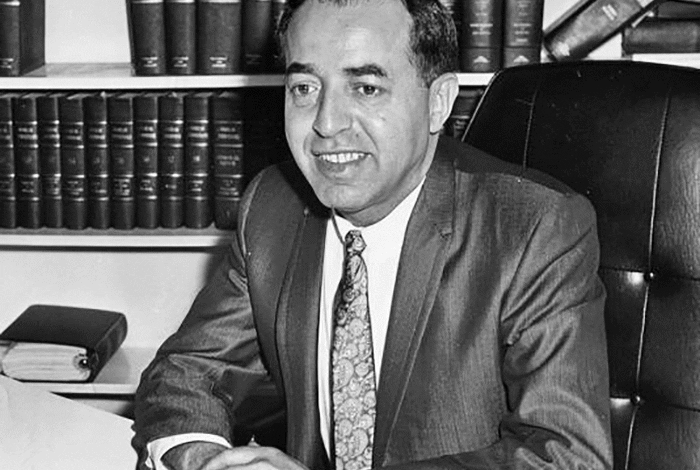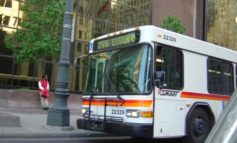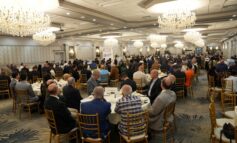
|
| Berry |
DEARBORN — The Southeast Michigan community is mourning the death of Arab American pioneer Michael Berry, 95, who passed away on Saturday, October 24.
Berry leaves behind a legacy that includes having had an international terminal at Detroit Metro Airport and a career center in the Dearborn Public Schools named in his honor.
He served as the chairman of the Wayne County Roads Commission from 1967 to 1982, prior to the establishment of a county executive position, making him a key figure in the region.
“He was very instrumental in getting a lot of money in the area, including building an international terminal at the airport which was named after him,” said 19th District Court Judge Sam Salamey.
Salamey, like many other leaders in the metro Detroit, viewed Berry as a trailblazer and mentor for the Arab American community.
For decades, he was widely regarded as a political leader, helping foster jobs for many immigrants and first generation Arabs who had settled in Michigan.
But even before these remarkable achievements, Berry was making strides in his earlier years as a first generation Arab American.
Born to Lebanese parents who had migrated to the U.S. in the early 1900s from the village of Tibneen, Berry was fourth of nine children. He was a teenager during the Great Depression, when his family struggled to make a living.
Berry would go on to pursue a local education, graduating from Fordson Junior College, Wayne College and Detroit College of Law. Following his graduation from law school in 1950, he became widely regarded as the first Arab American in Michigan to become a practicing lawyer.
In the 50s and 60s, Berry became the poster child and the embodiment of living the American Dream. He had four children with his now deceased first wife, Vivian.
He gained political ground during this period. He served as chair of the 16th Congressional Democratic District for four terms and would become a local leader of the Democratic Party.
He caught the eye of government officials in Washington D.C. when they were looking for Arab American role models to speak as ambassadors in the Middle East. He and his family traveled to Lebanon and Egypt in an attempt to strengthen U.S. relations in the Middle East and attract immigrants.
Berry’s place in the Democratic Party would continue to elevate as he opened up communications with major leaders, including Vice President Hubert Humphrey and Sen. Robert F. Kennedy shortly before his assassination. He became a spokesman for the Arab community when it needed a voice in America’s foreign policy decision making.
Hassan Jaber, executive director of ACCESS, said Berry put the Arab American community on the map from both a business and political standpoint.
“Sir Michael Berry was a visionary and was also very courageous,” Jaber said. “He had an unshakable loyalty to the community and to those who are underserved. He understood the importance of fully integrating Arab Americans into American society and showing Americans the value of their involvement.”
Berry’s connections with the UAW opened doors for many Arab Americans to seek employment opportunities with the big three automakers in Detroit. During his time as a commissioner, he notably hired dozens of qualified Arab Americans and other minorities into positions in the county.
“In the 60s, 70s, 80s and even into the early 90s, anyone who ran into a social, political or legal issue, the first thing someone would say is ‘did you see Michael Berry?’” Salamey said. “He held many powerful positions. Anyone who knocked on his door he would help them. He was a champion in helping the Arab American community.”
His achievements here were highlighted internationally as well. The Lebanese government honored him with the Knight of Cedars, a civil and military award considered the highest honor in the country. He was subsequently dubbed “Sir Michael Berry” among the Lebanese community.
Berry also faced tragedy and controversy during his time in the spotlight. In 1972, his wife, Vivian, was stabbed to death in her Plymouth Township home by a 17-year-old teen.
In the early 80s, he faced a backlash after a series of articles published by the Detroit News questioned his hiring and spending decisions in the county. Berry retaliated by claiming the media was targeting him because he was an Arab.
Berry served as a mentor for many in the community. Following his death, local leaders and activists weighed in with their thoughts on his impact.
“Personally I worked with him; he was my teacher and my mentor,” Salamey said. “If it wasn’t for him, I wouldn’t be where I am today. That’s something that holds true for so many people. It’s a big loss to the entire community, but his legacy will live on.”
“Your legacy will live for years and years to come,” said Wassim Mahfouz, president of the Lebanese American Heritage Club. “An American icon and a source of pride to the entire community. On behalf of your LAHC family, rest in peace, Sir Michael Berry.”
“The leadership, board and staff at ACCESS join the local and national Arab American community in mourning the loss of Sir Michael Berry, political pioneer, community leader and former chair of the Wayne County Road Commission,” ACCESS said in a statement.
“He was a mountain of a man,” said Dawud Walid, executive director of the Michigan Chapter of the Council on American Islamic Relations.
“In the coming years, people will say he was a trailblazer, a true founder of Dearborn like Conrad Ten Eyck, Henry Ford and many others,” said Brian Stone, a candidate for state representative. “And our city and state will forever be better for having had him. May he rest in peace.”
Berry is survived by his wife Cindy; four daughters; two sons; six grandchildren; four great grandchildren and three siblings.
Services were held at the Islamic Center of America on Wednesday, October 28. Berry was buried at Roseland Cemetery on Woodward and 12 Mile on Thursday, October 29.






Leave a Reply